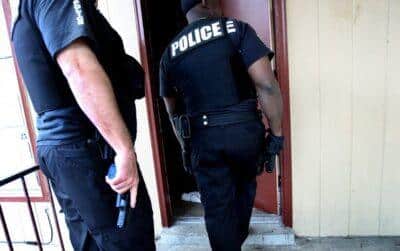
Image source: CommercialAppeal.com
Simply taking pictures of police officers has gotten a number of people arrested in Memphis, Tennessee, arrested. Several citizens have come forward and said that officers seized their phones and in some cases arrested them for taking pictures of and videoing cops trying to shut down a rap concert.
The incident took place on a public street and news articles indicate that officers were afraid that video of their behavior would end up on YouTube. This incident is disturbing because it is legal for citizens to take pictures of police and other government employees in public, say civil liberties groups.
Yet more and more citizens are reporting that police all over the country are trying to stop them from exercising this right. The problem has become so pervasive that the American Civil Liberties Union (ACLU) has actually created a special feature about it on its website.
“Unfortunately there is a widespread continuing pattern of law enforcement officers ordering people to stop taking photographs from public places, and harassing, detaining and arresting those who fail to comply,” the ACLU noted.
Conflicts between police and citizens because of cameras are growing problems, partially because of the widespread usage of high-quality cameras on smartphones.
You have a constitutional right to take pictures
“Taking pictures of things that are plainly visible from public spaces is a constitutional right,” the ACLU stated. The standard legal doctrine in the United States is that you have a right to take pictures of anything that happens in public.
They pledged their lives, their fortunes, and their sacred honor so that we could be free!
That means you can take pictures of police officers in the street, in public places such as parks and on the highway. The ACLU’s position is that this right extends to government buildings and public transportation systems such as light rail trains.
What you have a right to do:
- Videotape or photograph police officers and government employees in public no matter what they are doing.
- Videotape or photograph police officers and other government officials if they come onto your property or into your home.
- Film or photograph police officers on private property if they are plainly visible from the street or another public places.
What the police can and cannot do
Police officers’ power to stop filming or photography is actually very limited according to the ACLU. Here’s a rundown of what officers can and cannot do:
- A police officer can only confiscate your camera or phone if you are under arrest or if he or she has a valid search warrant.
- A police officer cannot ask you for your camera or phone or ask to see your camera or phone unless he or she arrests you.
- Police cannot delete photographs or video from your devices without your permission.
- Police can only stop you from filming or taking photographs if you are violating the law or presenting a legitimate threat to public safety. A cop can stop you from filming if you are standing in the middle of the street and blocking traffic. He cannot stop you from filming if you are standing on the sidewalk.
- Police cannot simply order you to stop filming or taking pictures in public. It is not clear if police have the right to examine your videos or pictures without a warrant when you are under arrest. The courts have not ruled on this issue yet although the ACLU’s position is that a search warrant is required for police to examine your digital images.
- The police can stop you from filming if you are on private property and the property owner asks them to do so. Filming and taking pictures on private property without permission are considered trespassing, which is a crime.
- Police can stop you from taking pictures in a government building or facility where there is a clearly posted policy against photography. This might include a prison or a military base where classified materials are stored.
 Off The Grid News Better Ideas For Off The Grid Living
Off The Grid News Better Ideas For Off The Grid Living



